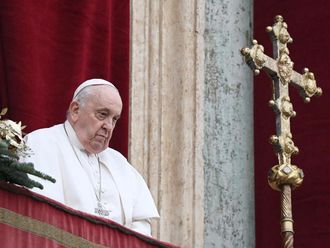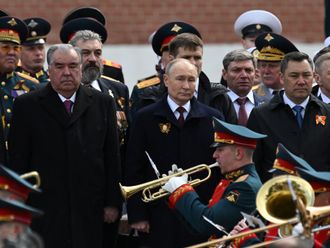Belfast: More then 30 police officers were injured and 11 people arrested during overnight violence around traditional Orange Day parades in Northern Ireland, authorities said on Saturday.
Thousands of pro-British Protestants march every summer in the British province, a regular flashpoint for sectarian violence as Catholics, many of whom favour unification with Ireland, see the parades as a provocation.
Violence between the two religious groups still sometimes flares since a peace deal was signed in 1998, which largely ended three decades of trouble. Much of Belfast remains divided along religious and nationalist lines.
A total 32 police were injured in what Chief Constable Matt Baggott described as “shocking and disgraceful” violence, including head, eye and leg wounds. Another 400 reinforcements were being brought in from Britain.
A leading Northern Irish politician was knocked unconscious on Friday by a missile.
Nigel Dodds, the deputy leader of the Democratic Unionist Party (DUP) — the province’s pro-British, Protestant, conservative largest party — was rushed to hospital after being hit in the clashes.
It followed a day of what had been peaceful Twelfth of July parades across Northern Ireland, the pinnacle of Orange Order loyalists’ marching season.
Rioting Protestants, some wielding swords, attacked police at a roadblock across the loyalist marchers’ preferred route through north Belfast.
Petrol bombs, sticks, fireworks, bricks, bottles, beer cans, drain pipes, and part of a wall were hurled at police, with teenagers among the rioters.
Shirtless men, and others in football tops, attacked police vehicles and officers in riot gear.
Loyalist bandsmen played sectarian tunes.
Around 20 plastic bullets were fired and water cannon used by police. Seven officers were injured, at least three of them knocked unconscious.
Dodds has represented North Belfast in the British parliament since 2001. He had been urging people to desist from violence at the roadblock.
The BBC reported a man who treated Dodds at the scene as saying: “He grasped his head as he went down. He was knocked out cold. I put him in the recovery position and checked his airway.
“He was unlucky because he was also hit by water cannon as I was trying to administer first aid and he got soaked.”
The July 12 parade is the culmination of the Orange Order’s marching season, and is usually accompanied by violence. The day is a public holiday in Northern Ireland.
The march marks the Protestant king William III’s victory at the Battle of the Boyne in 1690 over the deposed Catholic king James II.
The marchers like to stick to traditional routes but there are often clashes as they sometimes pass through what have now become Catholic areas.
The violence broke out following a decision to bar loyalists from walking through a contested flashpoint area where Catholic republicans have gathered in the past to attack police.
Northern Ireland’s First Minister Peter Robinson, the DUP leader, appealed for “cool heads”.
“Violence and attacks on the Police Service of Northern Ireland and the wider community are wrong, can never be justified and must stop,” he said.
“Those who are using the cover of protest to attack the police are massively damaging the cause they support.”
Around 3,500 people died in the three decades of sectarian violence between Northern Ireland’s Catholics and Protestants that largely ended with a 1998 peace agreement, though sporadic unrest and bomb threats continue.











